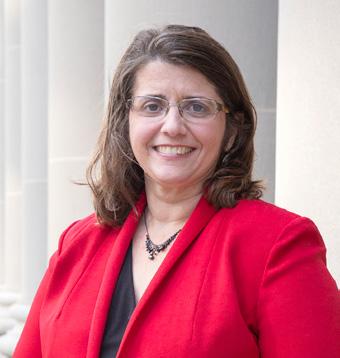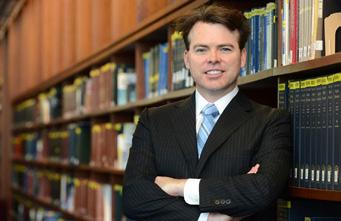
8 minute read
Faculty/Law School News
Carolyn Shapiro, Chicago-Kent College of Law professor and co-director of the Institute on the Supreme Court of the United States, was appointed in October 2021 to the Illinois Task Force on Constitutional Rights and Remedies by Illinois Senate President Don Harmon (39th District). The 19-member task force was created by the Illinois General Assembly to “develop and propose policies and procedures to review and reform constitutional rights and remedies, including qualified immunity for peace officers.” Shapiro focuses her research on the U.S. Supreme Court, its relationship to other courts and institutions, and its role in our constitutional democracy. She clerked for Justice Stephen Breyer in 1996–1997, has argued before the U.S. Supreme Court, and served as Illinois Solicitor General from 2014–2016.
Shapiro also testified at a congressional hearing in Washington, D.C., on July 28, 2022, about the history and future ramifications of a theory giving state legislatures exclusive authority over federal elections. Shapiro, who is Chicago-Kent’s associate dean for academic administration and strategic initiatives, testified before the Committee on House Administration during a hearing titled “The Independent State Legislature Theory [ISLT] and its Potential to Disrupt our Democracy.” The theory, which has been primarily backed by conservatives since Bush v. Gore, is based on language in the Elections Clause in Article One of the Constitution: “The times, places, and manner of holding elections for senators and representatives, shall be prescribed in each state by the legislature thereof.” Shapiro told the congressmen, “You need to be concerned about all of these decisions that the state courts have made [relating to ISLT], and all of the precedent that exists…whether or not those will continue to be effective with respect to federal elections.…There could be an enormous amount of chaos, to put it mildly.”
Advertisement
Raff Donelson, a legal philosophy and criminal law scholar, joined Chicago-Kent College of Law as an associate professor in fall 2022. Donelson’s research interests include moral philosophy, criminal law and procedure, constitutional law, and race and law. In his doctrinal work, he focused on constitutional protections for criminals and the accused, and his theoretical research interests include metaethics and general jurisprudence. Donelson’s research explores the “unexplored questions” about the fundamental concepts of law, punishment, and policing. As both a lawyer and philosopher, he sees criminal law as an area “where some of our most deeply held moral judgments become realized.” Donelson joined Chicago-Kent from Pennsylvania State University Dickinson Law, where he was an associate professor of law.

William A. Birdthistle
Chicago-Kent College of Law Professor William A. Birdthistle has been appointed director of the Division of Investment Management for the United States Securities and Exchange Commission. The Division of Investment Management “oversees mutual funds and other investment products and services that investors may use to help them buy a home, send kids to college, or prepare for retirement,” according to its website. The division’s primary responsibility is to enforce the Investment Company Act of 1940 and Investment Advisers Act of 1940, “which includes developing regulatory policy for investment companies and investment advisers.” A member of the Chicago-Kent faculty since 2006, Birdthistle conducts research in the areas of investment funds, executive compensation, and corporate governance.
Mandy Lee, the Chicago-Kent Law Library’s head of research and instruction, has been elected to head the largest law librarian association in Illinois next year. Lee was elected vice president and president-elect of the Chicago Association of Law Libraries, a professional law librarian association with 216 members who work in Chicago-area law firms, law schools, courts, and government. CALL’s bylaws call for the organization’s next elected president to first serve as vice president for a year. Lee’s term as president will start in May 2023.
Last year Lee received the national American Association of Law Libraries’ 2021 Minority Leadership Development Award for her “significant work supporting diversity and inclusion in the workplace and profession,” according to an AALL statement. Lee became chair of the AALL’s Asian American Law Librarians Caucus, where she created two new committees, a social committee and a community service committee. The latter committee hosted a “bystander intervention training” for all AALL members that focused on anti-Asian hate incidents. Lee has gone out of her way to introduce Chicago-Kent students and visiting scholars from foreign countries to Chicago, hosting three Thanksgiving dinners in two years.
When it comes to teaching machines how to understand and utilize language, it turns out that the more legalese that they know, the better, according to a new paper co-authored by Chicago-Kent College of Law Professor and Law Lab Director Daniel Martin Katz. His paper, “LexGLUE: A Benchmark Dataset for Legal Language Understanding in English,” explores how different large language models were used to solve a variety of tasks. The language models tested in Katz’s paper exposed machines to a large corpus of different words, and measured how effective those words were at getting the machines to solve various legal tasks. It turned out, of the seven different models that were tested, the model that taught legal language got the machines, on average, to perform tasks better.
Nicole Buonocore Porter has been appointed the new director of the renowned Martin H. Malin Institute for Law and the Workplace. Not only is Porter an accomplished academic, she worked for years at a large law firm and then in-house, representing employers. Her recent research explores the idea that “accommodations” shouldn’t just be for those with disabilities; workforce bureaucracies would be greatly eased if such benefits were explored for each and every employee. Porter began her academic career in 2004 at Saint Louis University School of Law, teaching employment discrimination and disability law. She landed at the University of Toledo in 2007 and took on ever-increasing responsibilities, starting as an assistant professor and working up to become the associate dean for academic affairs and later the associate dean for faculty research and development. Most recently, in 2021, she was honored as a Distinguished University Professor. Her upcoming book, The Workplace Reimagined: Accommodating Our Bodies and Our Lives, is due to be published this year by Cambridge University Press.
The author of a book on the legality of foreign interference in the United States was the recipient of the 2021 Chicago-Kent College of Law Roy C. Palmer Civil Liberties Prize. Jens David Ohlin, the Allan R. Tessler Dean and professor of law at Cornell Law School and a specialist in international law, wrote Election Interference: International Law and the Future of Democracy (published in 2020 by Cambridge University Press) to explore a seemingly simple question: is foreign election interference illegal? He believed it was, but not for the reasons everyone seemed to think. Rather than an attack on United States sovereignty, or a case of cyberwarfare, such interference was best understood as a violation of a crucial tenet of international law: self-determination, or the right of a country’s citizens to decide its own destiny.
Starting this year, Chicago-Kent College of Law is now offering a certificate program in cybersecurity unlike any other in the Chicago area. Designed for non-technical professionals in any field—from business executives to attorneys to risk management leaders—the program enables attendees to deepen their understanding of technology with accurate, up-to-date knowledge of what cybersecurity is and the risks it addresses. It allows members of the business, legal, and information technology communities to competently communicate with each other when addressing cybersecurity threats. The strength of the program lies in its instructors: a powerhouse of experienced executives who have assessed modern technological threats to major corporations and organizations.
Additionally this year, Chicago-Kent started a new online certification in privacy law for those working in jobs that involve the collection, management, or use of personal information—what has been called, “the new oil” of the digital economy. Chicago-Kent Adjunct Professor Peter Hanna, who will oversee the program, notes that as consumers increasingly adopt digital technology and devices into their lives, the data they generate creates enormous opportunity—and risk—for companies, governments, and society as a whole. The program is designed to provide professionals with the fundamental knowledge and foundation needed to analyze and understand the evolving privacy landscape.
Chicago-Kent College of Law has been awarded a $300,000 grant to study how to best support alumni in preparing for the bar exam. The grant, entitled “One and Done: A Chicago-Kent Bar Study Support Program,” was awarded by AccessLex Institute, a nonprofit based in West Chester, Pennsylvania, that is dedicated to the enhancement of legal education. Erin Crist, director of Chicago-Kent’s bar success program, notes that the grant will focus on studying three aspects of participant preparation. Alumni who might need additional help preparing for the bar will meet in a small group and with a faculty mentor; alumni will also receive a stipend that will allow them to work less while preparing for the bar; and they will receive social and emotional support through the process. The grant program started in June 2022 and will last four bar cycles over a period of two years.






